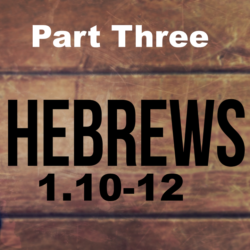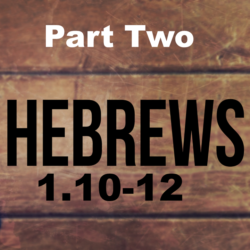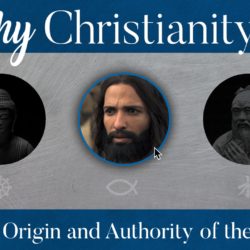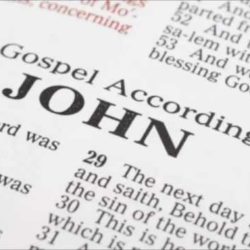Hebrews 1.10-12 is a confusing passage for many of us. It seems to say that Jesus created the heavens and the earth in the beginning. Today we are beginning a three part series in which Dr. Jerry Wierwille will address this important passage in context. Our first part is Wierwille’s presentation from last year’s UCA conference. In this overview, he reviews the context, extending from chapter 1 all the way to 2.8. Next he presents lexical connections between Hebrews 1 and wisdom literature. He concludes that Hebrews 1.10-12 is a wisdom christology text, attributing to Jesus what wisdom had accomplished prior to his birth.
Listen to this episode on Spotify or Apple Podcasts
Here is the paper that accompanies this talk.
 Loading...
Loading...
—— Links ——
- Check out these other episodes in this series on Hebrews 1
- See more episodes with Jerry Wierwille
- More resources on Hebrews 1.10
- Support Restitutio by donating here
- Designate Restitutio as your charity of choice for Amazon purchases
- Join our Restitutio Facebook Group and follow us on Twitter @RestitutioSF
- Leave a voice message via SpeakPipe with questions or comments and we may play them out on the air
- Intro music: Good Vibes by MBB Attribution-ShareAlike 3.0 Unported (CC BY-SA 3.0) Free Download / Stream: Music promoted by Audio Library.
- Who is Sean Finnegan? Read his bio here








There’s some great material in this message, really enjoyed it. I think Jerry misses the point with verses 10 to 12 of Hebrews 1.
Hebrews 1:10-12
10 And,
“You, Lord, laid the foundation of the earth in the beginning,
and the heavens are the works of Your hands.
11 They will perish, but You remain;
and they all will wear out like a garment;
12 as a cloak You will fold them up,
and they will be changed.
But You are the same,
and Your years will not end.”
In verse 10 we see it stated that ” the heavens are the works of Your hands.”
So who is this Lord referring to, the Father or Jesus? If we move over to chapter 2 we see the following:
Hebrews 2:5-8
5 For it was not to the angels that He has subjected the world to come, of which we are speaking. 6 But someone in a certain place testified, saying:
“What is man that You are mindful of him,
or the son of man that You care for him?
7 You made him a little lower than the angels;
You crowned him with glory and honor,
and set him over the works of Your hands.
8 You have put all things in subjection under his feet.”[a]
In verse 7 we see it stated that “and set him over the works of Your hands.”
So who is verse 7 referring to? As the write goes on to explain we see that it is Jesus, who was made a little lower than the angels. Jesus is the one who has been set over the works of the Lord’s hands.
With this in mind I don’t think we can apply the quote from chapter 1 verse 10 to Jesus. I believe the argument taking place here is that the Father is the one who laid the foundation, that these things are the works of the Father’s hands and some day they will be rolled up. Jesus has been called to sit at the Father’s right hand, a position no angel has been given, and in this position been set to rule over the works of the Father’s hands. In this position Jesus will some day execute the command of the Father to change them and the creation will be regenerated.
Your view, Corey, seems to have been shared by Andrew Norton, in his book of 1833.
Unless otherwise consulted – check out the online bible, and commentary, of the ‘Revised English Version.’
Hi Corey,
Thanks for your comments. I am familiar with your line of interpretation. The problem I see with arguing that because the phrase “works of your hands” appears in Heb 1:10 and 2:7 (quoted from two different psalms – Ps 102:25-27 and 8:4-6) that we can take the referent in Heb 2:7 and apply it directly to 1:10 is that it requires the hidden assumption that both psalms in both Hebrews passages are being used to establish the same point by the author. I think this assumption is one of the reasons this interpretation is unsustainable exegetically.
Do you have data that can be used to substantiate that these two verses are univocal in meaning, and thereby it is legitimate to transfer/combine their individual contexts in Hebrews and transfer one referent onto the other?
Blessings,
Jerry
An excellent presentation by Jerry – but one point of variance :
On page seven of his Paper, Jerry writes [capitalization added] :
” Christ, who was ‘flesh and blood’ LIKE [Gk. ‘paraplesios’] the rest of humanity(Heb. 2:14), faced death for his ‘brothers and sisters’ (Heb. 2:11) …….Christ …[was] THE REPRESENTATIVE HUMAN who has become perfect through his death so that he can lead many sons and daughters to glory (Heb. 2:10)”.
As I understand it, Jerry is the co-translator and a co-commentator of the ‘Revised English Bible’ [REV], which interpret ‘paraplesios’ in Heb 2:14, to mean that the human nature of Jesus was only ‘LIKE’ ours, and not ‘THE SAME AS’ as ours [i.e. Jesus (supposedly), did not share our fallen human nature, but (supposedly) had immaculate, pre-Fall, human nature].
Jerry also mentioned N.T. Wright (who was tutored at Oxford University by George Bradford Caird) – and this is how N.T. Wright translates Hebrews 2:14 :
“Since the children share in flesh and blood, He [Jesus] too shared in them, IN JUST THE SAME WAY [Gk. ‘paraplesios’], so that through death he might destroy the devil ..”
IF Jerry and the ‘Revised English Version’ Bible/Commentary are correct in believing that Jesus did not share our (fallen) human nature, then :
1. How could Jesus be OUR HUMAN REPRESENTATIVE (If Jesus didn’t share OUR human nature)?
2. How can Jesus truly have taken upon himself descent from Abraham (Heb. 2:16) ? (Did Abraham have OUR fallen human nature, or not?)
3. How could Jesus have :
“been tempted in every way JUST AS WE ARE” [REV translation],
if Jesus had a superior (immaculate) human nature to our own (fallen) human nature?
4. How could God have been able to ‘condemn sin in the flesh’ (Rom. 8:3), if Jesus did not share OUR human nature – which is exposed to the power of sin ? i.e. Jesus fully shared in our human nature, and was, as we are, exposed to the power of Sin, BUT HE UNIQUELY DID NOT SUCCUMB TO THAT POWER (Hebrews 4:15). That is, Jesus uniquely won the victory over the power of Sin within the very territory [our human nature] where ‘Sin’ had hitherto, reigned supreme (Rom. 3:9). Consequently, by being united to Christ (Rom. 6:2-22), we can come to share (progressively) in his human victory over the power of Sin (Romans 8:1-5; 10-14).
Hi John,
It seems you start off interacting with a statement I made in the paper, but then it appears you quickly venture off in another direction that I don’t see as being germane to what I present. Nonetheless, please see my comments on the next episode where I address your question.
Thanks and blessings,
Jerry
Thank you, Jerry, and God’s blessings to you.
Hi, Sean – an expeditious postscript regarding the Christology of Hebrews chapters 1-2:
The view that the New Testament points to Jesus assuming fallen human nature is supported by New Testament, and Pauline scholars : James Dunn, C.E.B. Cranfield, C.K. Barrett, Kenneth Grayston, William Barclay and Karl Barth, et al.
” The conception that at the incarnation God did not assume human nature in its corrupt sinful state but only joined Himself with a humanity absolutely purified from all sin contradicts not only the anthropological radicality of sin, but also the testimony of the New Testament and of early Christian theology that the Son of God assumed sinful flesh and in sinful flesh itself overcame sin. ”
Wolfhart Pannenberg, ‘Jesus – God and Man’, p.362.
I agree with the earlier comment by Corey Evans. It seems that when Jerry imports the Wisdom Christology paradigm from the external Jewish sources, he misses the point of Heb 1:10-12. It’s not necessary at all. The quotations from the Hebrew Bible in Heb 1:8-9 and Heb 1:10-12 are passages about God the Father showing that it was always the Father’s intent to enthrone the son forever when it was time to change the order of creation in the last days.
Hi Michael,
Would you support the claim that you think vv. 8-9 and vv. 10-12 are about God the Father? Your assertion about the “Father’s intent…” is only an assertion. Do you have any research data that substantiates that claim? What I mean is can you show on the basis of grammatical, historical, linguistic, etc. evidence that the addressee is God the Father. I show in my paper significant data that points toward vv. 10-12 being applied to and directed at the Son. Do you disagree with any of that data? If so, can you explain why? It will help to know where you are coming from so that we can dialogue more about it.
Sincerely,
Jerry